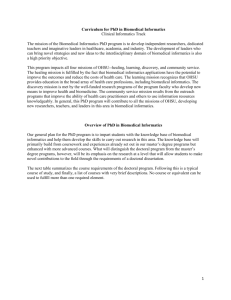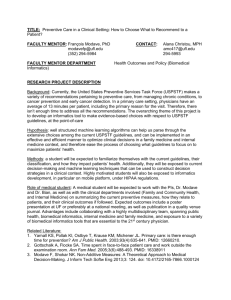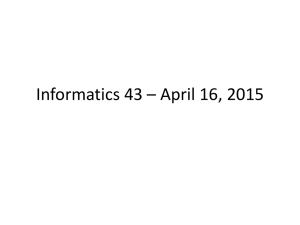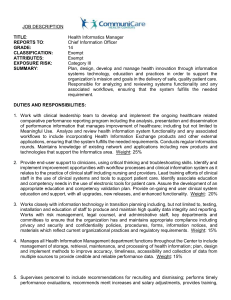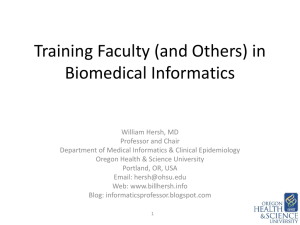Ph.D. Curriculum - Bioinformatics Track
advertisement
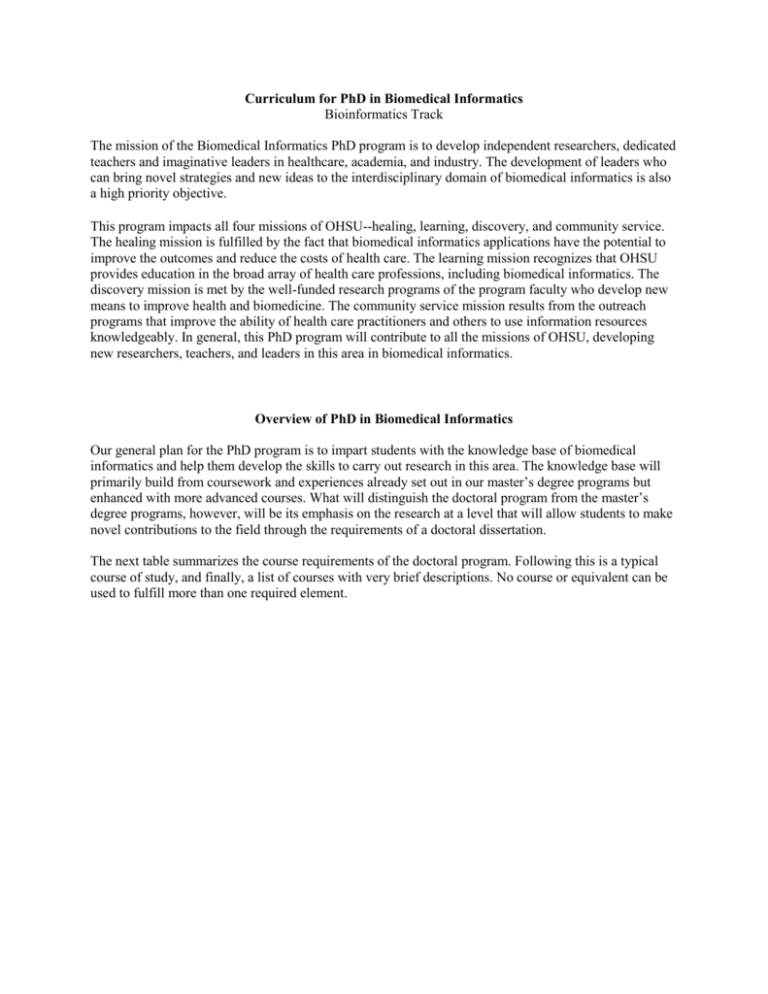
Curriculum for PhD in Biomedical Informatics Bioinformatics Track The mission of the Biomedical Informatics PhD program is to develop independent researchers, dedicated teachers and imaginative leaders in healthcare, academia, and industry. The development of leaders who can bring novel strategies and new ideas to the interdisciplinary domain of biomedical informatics is also a high priority objective. This program impacts all four missions of OHSU--healing, learning, discovery, and community service. The healing mission is fulfilled by the fact that biomedical informatics applications have the potential to improve the outcomes and reduce the costs of health care. The learning mission recognizes that OHSU provides education in the broad array of health care professions, including biomedical informatics. The discovery mission is met by the well-funded research programs of the program faculty who develop new means to improve health and biomedicine. The community service mission results from the outreach programs that improve the ability of health care practitioners and others to use information resources knowledgeably. In general, this PhD program will contribute to all the missions of OHSU, developing new researchers, teachers, and leaders in this area in biomedical informatics. Overview of PhD in Biomedical Informatics Our general plan for the PhD program is to impart students with the knowledge base of biomedical informatics and help them develop the skills to carry out research in this area. The knowledge base will primarily build from coursework and experiences already set out in our master’s degree programs but enhanced with more advanced courses. What will distinguish the doctoral program from the master’s degree programs, however, will be its emphasis on the research at a level that will allow students to make novel contributions to the field through the requirements of a doctoral dissertation. The next table summarizes the course requirements of the doctoral program. Following this is a typical course of study, and finally, a list of courses with very brief descriptions. No course or equivalent can be used to fulfill more than one required element. Required Elements Demonstration of Bioinformatics knowledge Reading and Conference Advanced Research Methods Cognate Area (distributed across departments or concentrated within one department) Symposium Mentored Teaching Prep and Mentored Teaching Notes Students will be required to complete all the subject (nonthesis/non-capstone) courses of the master’s degree programs in the Bioinformatics track. Students will also be required to complete more advanced electives offered by the DMICE and other departments. Students will be required to present a key paper or research method in their field of research. These classes should be design and methods classes and can come from computational, social, and other sciences. These classes should be relevant to the proposed area of research; examples include a 3-course sequence in statistics geared toward doctoral students or a comparable sequence in computational analytical techniques. These should be graduate level courses and may be taken at other institutions or in other OHSU departments. In consultation with the academic advisor, students will select 4 courses to complement the proposed area of research. These should be graduate level courses and may be taken at other institutions or in other OHSU departments. Students will present a state of the art literature synthesis in one area of research. Presenter will answer questions from other students and will be graded by 3 faculty members. Each student presentation should last no more than 40 minutes and should conclude with one or two original questions for further research. Students develop a contract with mentor for teaching experience. Decisions will be made regarding lectures, deadlines, scope and Total Minimum Credits A minimum of 43 credits of subject courses will be required (similar to the master’s degree programs). Students with a background in certain areas (e.g., medicine or computer science) may substitute other courses but still must complete the required minimum 43 credits. 10 credits minimum 12 credits minimum; coherent set of courses approved by advisor. 12 credits minimum; cohesive set of courses to demonstrate depth in a cognate area in medical informatics 3 credits; may be taken before or after qualifying exams 8 credits minimum (2X, 4 credits per sequence) Research and Dissertation topics to be covered. Prepare lesson plans, course materials with Mentor (syllabus, calendar, lectures). Students then teach a subject area course under the mentorship of a faculty member. To be taken with advisor 48 credits We anticipate that most students will take from 18-24 months to complete coursework and take qualifying exams (written and oral); and another 12-24 months to conduct independent research, prepare a dissertation, publicly present and orally defend it. Students who already have a master’s or equivalent degree in biomedical informatics may spend less time in the coursework phase. The following is a typical timeline for the program: Year 1 Fall Subject courses Winter Subject courses Spring Subject courses Summer Subject courses 2 Subject courses Advanced Research Methods Cognate Area Advanced Research Methods Cognate Area Advanced Research Methods Comprehensive exams* (preliminary to candidacy) 3 Research Symposium + Research Proposal defense + Research Mentored Teaching Prep + Research 4 Mentored Teaching + Mentored Teaching Prep + Research Mentored Teaching + Research Dissertation + Pre-defense + Oral defense and final write-up * To comply with the fair use fair use doctrine of the US copyright law, Sakai course sites close three weeks after grades are posted with the Registrar. PhD students should download all course materials at the end of each course in order to prepare for comprehensive exams at the end of Year 2. Doctoral students will be required to maintain enrollment during the entire period of their training. This requirement will be satisfied by coursework during the pre-candidacy period and with dissertation and research enrollment after being admitted to candidacy. A residency requirement of 12-15 credits for six consecutive terms is required in accordance with the by-laws of the School of Medicine Graduate Council. A minimum of 135 credits will be required for graduation. It is expected that students’ progress toward candidacy will be monitored in a number of ways: Doctoral students will be required to develop expertise in a cognate area of their own choosing which supplies a coherent course of study leading to the research they intend to pursue for their doctoral work. It is expected that students will likewise develop relationships with faculty outside of the department whose expertise will also be utilized during the dissertation research or writing stage and who can serve as consultants or members of the dissertation advisory committee. Doctoral students will be required to present at a symposium following the successful completion of the qualifying exam. Under the tutelage of a faculty mentor, they will do an exhaustive, critical review of the research literature in a narrowly defined area, publicly present their analytical findings, and answer questions posed by a faculty reviewer. Doctoral students will demonstrate research proficiency in a qualifying exam before being admitted to candidacy. Research proficiency will be demonstrated through the writing of a publishable article demonstrating depth of understanding. This article will form the basis of an oral exam given by a committee of four members of the graduate faculty and an optional member of a faculty member outside the graduate faculty. This committee need not be the same one the student will convene as a doctoral advisory committee. OHSU PhD in Biomedical Informatics Curriculum Bioinformatics Track Core informatics knowledge (43 hours) Reading & Conference (10 hours) Advanced research methods (12 hours beyond minimum in MS) Cognate – area outside informatics (12 hours) Comprehensive/Qualifying examination Mentored Teaching and Prep (8 hours) Symposium (3 hours) Research and dissertation (48 hours)
